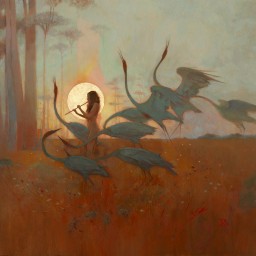 Review by Rexorcist for Alcest - Les chants de l’aurore (2024)
Review by Rexorcist for Alcest - Les chants de l’aurore (2024)
Once again we have a fine example of Alcest challenging the very notion of evil in the black metal sound. There will be, however, some debate as to how "black" this album really is, considering that the usage of the genre seems to be limited to certain artistic choices between songs. In the opener, Komorebi, the blackness that helps to open the song is overshadowed by epic choir vocals like something out of a Hans Zimmer score or a Celtic new age album. However, L'envol isn't afraid to follow up the new age vocals that take the final act with a direct assault of atmo-black metal and kickstart another uplifting and catchy piece of pure Alcest. Neige's vocals are just as clear and crystalline as ever. Thanks to its incredibly cheerful approach, you can look back on a song and think to yourself, "this was eight minutes long!?" It still spends more time focusing on the post-metal, though. If you want straight up blackgaze, then Améthyste is the way to go. You can get just as lost in the atmosphere as you do in the rhythms.
Kickstarting the second half is the last of the two singles, the first being L'envol. Flamme Jumelle is a post-rock track that carries all the themes through a lighter, more accessible rock sound but manages to maintain the Alcest appeal perfectly, even when incorporating the mesmerizing tremelo-picking. I can see this being an Alcest stape for future concerts. Next is a piano and violin semi-instrumental (don't worry, it's only three minutes long), Réminiscence, which features Neige vocalizing in ways that just make me wanna effing meditate. The incorporation of new age elements was a spot-on choice. Next is L'Enfant de la Lune, which isn't quite as cutesy as the name would suggest, but makes for a good post-metal track that focuses on anthemic energy. It carries a heavily noisy approach but never really steers into blackgaze. Thankfully, this decision made the song more unique to the album as its approach was used similarly in Améthyste. We end things with L’adieu, which stays soft, ambient and serene throughout the whole five minutes, relying entirely on the sunset calm to recall the imagerey of that album cover in a more realistic fashion. Perfect ending.
It must be mentioned that Alcest is NOT, I repeat, NOT, trying anything that new. Just because there's less blackgaze on this album than before doesn't mean it's new for them. They're essentially repeating the less blackened songs of their past albums. The one time they changed their style, there was a little backlash, even though the album was alright. And if you ever read one of my reviews, you'd likely know that I'm the guy who promotes trying new thing and typically hates copying the hits. The thing is, Alcest's structuring of compositions and rhythms is certainly not conventional, and because of this, five albums of great blackgaze just isn't enough. Pair this with the fact that there are very few in this wonderful gimmick genre that can butt heads with the likes of Alcest and Deafheaven, and you may find yourself running back to this essential French band for more and more. Some say Sadness can, but is three bands really enough? But this album still isn't blackgaze, really. It's a further exercise in pretty atmospheres that's even less distracted by the depression and evil often associated with black metal.
So time for the four questions:
1. What is the goal of this album? Seems to be an exercize in uplifting summery atmosphere rather than a blackgaze album, so the goal must be a slightly new direction that fans will still get behind.
2. Does it meet its goal? Well as an Alcest fan who just read some ratings after the album finished, I can guarantee that this is a major yes.
3. What did the album sacrifice or neglect to meet its goal? Really, the fact that this new direction is slight means there's some unoriginality involved.
4. Are the sacrifices made up for by other aspects of the album? Considering that the album still meets my standards for variety, atmosphere, rhythmic prowess, etc., I'm gonna say yes.
So this Alcest album is a grand reminder of what Alcest is capable of, but if you look at it closely, you'll see the band wants to go for something a little new. Nevertheless, they still put passion in it and are aware of their skills. I can see this being argued as a contender for best metal album of the year by the masses. I don't think I'd go that far (my current choice is Coagulated Bliss), but I've been waiting for the new Alcest since Spiritual Instinct, and now I'll be even more eagerly awaiting the eight studio album. Les chants de l’aurore cancelled out all my worries that Alcest lost its potency, even if their "new ideas" are technically reorganized rehashes of past ones.
